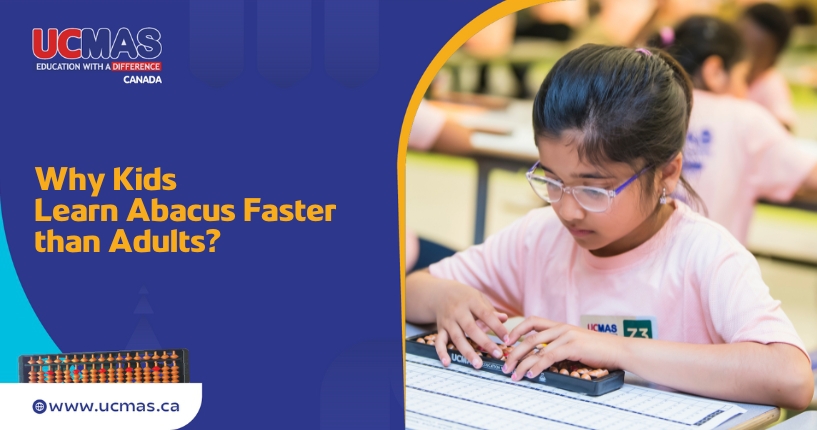
Learning the abacus is an ancient and proven method for developing mental arithmetic skills, but have you ever wondered why children seem to master this tool faster than adults? It’s not just because their minds are more flexible, there are several psychological, neurological, and even emotional factors at play.
Imagine a room where you hear the gentle sound of beads moving along rods, with little hands moving at lightning speed. Kids are solving complex equations faster than most adults can even grab a calculator. It’s not some gathering of math geniuses, it’s just an ordinary day in an abacus training class. But why is it that these kids seem to pick up this ancient tool so easily, while many adults find it hard to understand the basics?
Abacus: A Tool for All Ages
Kids naturally grasp the abacus with ease, making it a great tool for them to develop mental math skills early on. The benefits of this ancient tool aren’t just for children, though, they’re for everyone, no matter your age. Using an abacus helps boost brainpower, sharpens number skills, and gives a sense of achievement, whether you’re young or old.
For parents and teachers, introducing the abacus early can pave the way for kids to feel confident with math and thrive. And for adults up for the challenge, learning the abacus can reshape how they think about numbers and open up to new mental abilities.
The Brain’s Role in Learning
During childhood, the brain is highly plastic, forming new neural connections rapidly. This flexibility, called neuroplasticity, allows kids to easily grasp languages, motor skills, and abstract concepts like math. The abacus, blending hands-on learning with mental math, is ideal for this critical stage of brain development.
When children train with an abacus, they’re rewiring how their brains handle numbers and logic, turning learning into a fun, effortless process. In contrast, adults face difficulty reconfiguring established brain pathways to adapt to new learning styles like the abacus
Emotional Connection to Learning
Children approach learning with curiosity, excitement, and playfulness. They’re naturally inclined to explore new things without fear of failure. The abacus, being a tactile tool, makes learning math more engaging and enjoyable for children. They see it as a game, not a task, which increases their motivation and retention. This emotional connection acts as a crucial part of accelerating their learning process.
Fear of Failure in Adults
Many adults carry past experiences that affect their learning. For example, if someone had a hard time with math in the past, they might feel anxious or hesitant when learning the abacus. This emotional barrier can make it harder to pick up new skills. Unlike children, who usually approach learning with curiosity, adults sometimes bring this fear with them, which is why children learn abacus easily compared to adults.
The Role of Imagination
One of the fascinating aspects of abacus training is its reliance on visualization. As children advance in abacus learning, they no longer need the physical abacus; they start to visualize the abacus in their minds, moving the beads mentally to calculate numbers. Children have a vivid imagination, and they naturally engage in pretend play. This kind of play helps them picture abstract ideas, making it easier for them to grasp mental arithmetic and adapt to new concepts.
Playful Learning Approach
As said by O. Fred Donaldson, “Children learn as they play. Most importantly, in play, children learn how to learn.”
Play is a crucial element in how children learn. Through play, children not only engage more deeply with the material but also develop stronger cognitive and emotional connections to what they’re learning. In abacus learning, children might race against the clock, compete with their peers, or try to beat their own record, all forms of play that make learning faster and more efficient. Adults rarely engage with learning in this way, making their experience with the abacus slower and less engaging.
Patience vs. Speed of Learning
Children learn abacus easily compared to adults because they don’t rush the process. They’re more patient and willing to practice regularly, sometimes for months or even years, without expecting instant results. For kids, learning is a journey. On the other hand, adults tend to expect quick progress and may get frustrated when they don’t get expected results, which can make it harder for them to master the abacus.
What Can Adults Learn from Children?
While children’s brains may be more adaptable and their imaginations more vivid, there’s still hope for adults who want to learn the abacus. Adults can benefit from adopting a more playful, patient, and emotionally positive approach to learning. By engaging in regular practice, reducing cognitive overload, and embracing the fun side of learning, adults can improve their ability to master the abacus or any other new skill.
As said by Jean Piaget (Swiss Psychologist), “Every time we teach a child something, we prevent him from inventing it himself.”
Therefore at UCMAS, we empower children to be creative thinkers from all aspects rather than just passive learners. Our Abacus classes for children are known to enhance focus, memory, and creative problem-solving abilities, all while making learning fun. At UCMAS, we integrate these techniques to create a well-rounded mental math program that supports your child’s overall development.
Reach out to us and book an info session to discover how UCMAS can naturally nurture your child’s potential, not just in math, but in critical thinking and lifelong learning.





